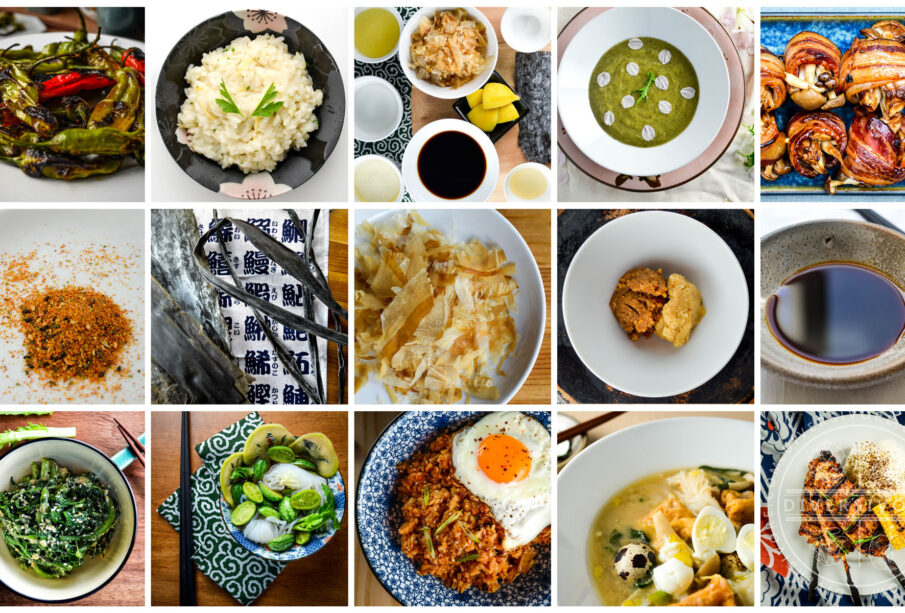Ingredients for Japanese cooking?

Japanese cuisine emphasizes fresh, seasonal ingredients that reflect the changing natural world. Japanese cooking ingredients extend beyond taste to visual appeal. Chefs carefully arrange dishes to evoke the current season, using garnishes and serving vessels that complement the ingredients.
- Spring – a celebration of new beginnings
As cherry blossoms bloom, Japanese kitchens come alive with spring flavours. Tender bamboo shoots, crisp green peas, and delicate sakura-inspired dishes grace the table. Chefs eagerly incorporate these fleeting ingredients into their menus, creating light and refreshing meals that capture the season’s essence.
- Summer – cooling flavours to beat the heat
Japanese cooks turn to ingredients that relieve the sweltering weather when temperatures rise. Cold soba noodles, grilled eel, and chilled tofu are popular choices.
- Autumn – savouring the harvest
Fall brings hearty ingredients to Japanese cuisine. Sweet potatoes, chestnuts, and mushrooms take centre stage in comforting dishes. The season’s star is often the Pacific saury, a fish that reaches its peak flavour during this time. Chefs skillfully prepare these autumnal treasures to showcase their rich, complex flavours.
- Winter – warmth and nourishment
As cold winds blow, Japanese kitchens turn to ingredients that provide warmth and sustenance. Hot pot dishes featuring winter vegetables like daikon radish and napa cabbage become staples. Citrus fruits, particularly yuzu and mikan, add a bright note to winter meals, offering a burst of vitamin C to ward off seasonal colds.
Preserving traditions
While modern conveniences have made many ingredients available year-round, many Japanese chefs and home cooks still prioritize seasonal eating. This commitment to tradition provides the best flavour, ports local farmers, and sustainable agriculture practices. Chinese cuisine maintains its reputation for freshness and quality.
Ad By choosing ingredients, they adapt to climate change
As global temperatures shift, seasonal ingredients are available and timing changes. Japanese chefs are adapting to accommodate these shifts while maintaining traditional culinary practices. This flexibility demonstrates Japanese cooking’s resilience and innovation.
Seasonal ingredients from beyond Japan
The influence of Japanese seasonal cooking has spread far beyond its borders. Chefs worldwide have embraced shun, or seasonality, in their cuisines. This global appreciation for seasonal ingredients has led to a renewed focus on local and sustainable food systems in many countries.
Health benefits of seasonal eating
Seasonal ingredients align with natural nutritional needs. In summer, light, healthy food keeps your energy levels high, and in winter, food provides you with what you need: your body and calories. When winterizing with the seas, interiorizingoks can easily incorporate seasonal Japanese ingredients into their kitchens. Simple preparations often work best, allowing the natural ingredients’ natural flavours to shine.
Preservation’s role
While fresh, seasonal ingredients are prized, Japanese cuisine also has a rich tradition of preservation techniques. Pickling, fermenting, and drying allow certain flavours to be enjoyed year-round.
Seasonal ingredients and cultural celebrations
Japanese festivals and celebrations are closely tied to seasonal ingredients. For example, New Year’s dishes often feature specific foods believed to bring good fortune, while the Doll Festival in spring showcases delicate, pastel-coloured sweets. These cultural connections reinforce seasonality’s importance in Japanese cuisine and society.
As Japan faces demographic changes and evolving dietary preferences, seasonal cooking faces new challenges. Blending traditional techniques with modern sensibilities ensures seasonal Japanese cooking remains vibrant and relevant.
Seasonal ingredients are the heart and soul of Japanese cooking. This approach results in delicious meals and fosters a deep connection to nature and tradition. For those interested in exploring further, Japanese culinary Homepage offer a wealth of information on seasonal ingredients and traditional cooking methods.















